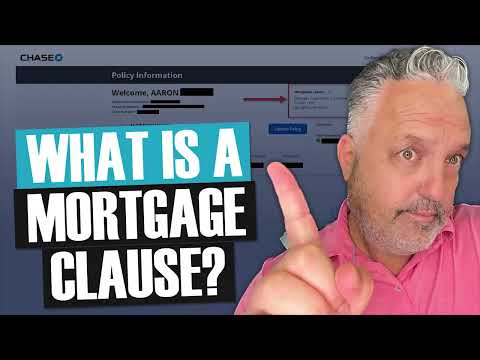Decoding the Mortgagee Clause: A Vital Provision in Home Loans
Alright, folks, let’s dive right in! When we talk mortgages, there’s this one part that’s as crucial as a touchdown in the last seconds of the Super Bowl – the mortgagee clause. Now, you might be asking, “What’s this mortgagee clause all about?” Imagine it as the unsung hero of home loans, a safety net that ensures lending doesn’t turn into a high-wire act without a net.

The mortgagee clause is the shield that protects both the lender and the borrower if an unexpected catastrophe hits the property, like a giant dog legs stepping on your flower bed, just kidding. It tells the insurance world precisely who’s got a vested interest in your humble abode (that’s the lender, by the way). For lenders, it’s their assurance. For borrowers, it’s making sure that if disaster strikes, the funds needed for repairs or to cover that bad luck won’t come out of their piggy banks.
So why does it matter? Because without it, the road to homeownership could get as messy as a toddler’s playroom – lenders wouldn’t touch a mortgage with a ten-foot pole if they weren’t named in the insurance policy. But with it, lenders are more willing to lend, and borrowers can sleep easier at night, knowing they aren’t left high and dry.

The Anatomy of a Mortgage Clause: Understanding its Components
Let’s slice and dice the mortgage clause so we get what makes it tick. A standard mortgagee clause, also known as the union mortgage clause, is this intricate piece of legal text that’s about as easy to understand as quantum physics. But in plain English, it’s the lender saying to the insurance folks, “Hey, if my borrower does something silly like setting the kitchen on fire – on purpose – you still gotta pay me.”
A lender’s rights within a mortgagee clause are rock solid. They’re like a no-nonsense bouncer at a club; even if you mess up, they’re still getting their dues. And here’s a nugget of gold – don’t mix up a mortgage clause with the mortgagee clause. The former’s a broader term that can refer to any condition in a mortgage contract, while the latter is all about that insurance protection.

| **Aspect** | **Details** |
|---|---|
| Definition | A provision in property insurance policies that protects the mortgage lender’s interest in the property if it is damaged. |
| Purpose | To ensure the lender receives payment for a loss even if the borrower defaults, especially in cases where the damage is due to borrower negligence. |
| Beneficiaries | Both the mortgage lender (mortgagee) and the borrower (mortgagor). The mortgagee’s investment is protected, and the mortgagor benefits from reimbursed repairs. |
| Distinction From Other Addresses | The mortgagee clause identifies a specific address for insurance purposes, different from the lender’s corporate or payment processing addresses. |
| Importance to Borrowers | This clause ensures that their property remains funded for necessary repairs after damage, indirectly safeguarding their home investment. |
| Importance to Lenders | The clause provides financial protection for lenders, enabling them to recover their loan amount if the property incurs insurable damage. |
| Standard (Union) Mortgage Clause | A specific form of the clause where the mortgage lender (and not the borrower) is compensated for loss involving the mortgaged property, especially if the borrower is at fault. |
| Impact on Insurance Claims | The insurance company must settle any claim with both the lender and borrower, with the lender commonly having the first claim to the insurance proceeds. |
| Example of a Mortgagee | Financial institutions like banks or credit unions, private lenders, friends, family, or investor groups who lend money for real estate purchases. |
| Notable Exclusion | Does not protect the borrower’s personal property or interest in the excess proceeds from insurance claims after the mortgage is paid off. |
Legal Implications of the Mortgagee Clause in Lender Protection
Now, the mortgagee clause ain’t just legalese mumbo-jumbo; it’s a contract provision with teeth. In the courtroom, it turns into the lender’s sword and shield, ensuring their investment is safeguarded even if the insurance company tries to wriggle out of the deal. Courts have a track record of siding with lenders, making sure they get their fair share even when all Hades breaks loose.
Take for instance that one time (not at band camp, but in court) where the borrower had a total ‘oops’ moment – think firework display in the living room. Even then, the judge ruled that the lender should be paid out by the insurance, thanks to the rock-solid mortgagee clause. These rulings show that courts treat this clause as a pretty big deal, and so should you.

Mortgagee Clauses Across Different States: A Comparative Analysis
Now, let’s hop on a road trip across the US of A. You’ll find each state has its own quirky take on the mortgagee clause. It’s like comparing New York’s pizza to Chicago’s – they’re both awesome, but they have their own local flavor. Navigating multi-state mortgage contracts can be as complex as a Rubik’s Cube.
For instance, while the base ingredients of the clause are mostly consistent, some states add a pinch of this and a dash of that, changing how the clause behaves. A local law might say that insurers have extra hoops to jump through before denying a lender’s claim. Understanding these modifications is crucial ’cause nobody wants to be blindsided by fine print, right?

The Impact of Mortgagee Clause on Insurance Policies for Your Home
Picture this: your home’s just been through the ringer – a storm, a flood, a freaky accident. You’ve got insurance, but if you hadn’t smartly included the mortgagee clause, you might as well be playing hot potato with your payout. This magical clause makes sure that the insurance money goes right into the lender’s hands to fix your castle, rather than vanishing like a ghost.
In real-world terms, here’s what happens: your house takes a beating, you file a claim, and because the lender is named by the clause, the insurance company cuts a check straight to them. The money is used for repairs, not vacations, keeping everything above board. It’s like insurance money wearing a GPS tracker; it can only go to one place.

Mortgagee Clause Pitfalls: Navigating Common Misunderstandings
Now, let’s clear the air on some pesky misconceptions about the mortgagee clause. Some folks think it’s as confusing as trying to solve a mystery without a clue. But don’t fret, here’s the straight deal: the mortgagee clause is not your enemy. It’s just misunderstood, like the monster in a horror flick that just needs a hug.
Is the mortgagee clause just an address?
Oh, don’t let the term “mortgagee clause” fool you—it’s more than just a simple address! It’s a key component in a homeowner’s insurance policy, ensuring that the lender (aka mortgagee) gets paid if disaster strikes your humble abode. It’s like the lender’s safety net, hitched onto your policy.
What is the standard mortgage clause?
So, what’s the standard mortgage clause all about? Well, in the mortgage world, it’s pretty much the bread and butter of a contract. It fully details the lender’s rights in case you, the borrower, decide to say “sayonara” to your mortgage payments. It’s the lender’s shield, guarding them from any financial blows if things go sour with the loan.
What is an example of a mortgagee?
Ever wondered who a mortgagee might be? Take a bank or a mortgage lender—they’re classic examples. They’re the ones lending you the moolah to snag your dream home, all while keeping their fingers crossed that you’ll pay it back on time.
What clauses are included in a mortgage?
Mortgages come with more clauses than a Santa convention! You’ll find the acceleration clause, which speeds things up if you miss payments, and the due-on-sale clause, which is the lender’s “no-cutting-in-line” rule for when you sell the place. Then there’s the escrow clause, making sure taxes and insurance are paid without you having to sweat it.
What is a mortgagee clause address?
The mortgagee clause address is the lender’s official spot on the map—a place where all the insurance checks are sent if your house goes through a rough patch. Think of it as the lender’s mailbox for the not-so-good times.
Do I need a mortgagee protection clause?
Ah, the mortgagee protection clause, my friend—do you need it? Absolutely! It’s like the lender’s invisible armor, protecting their investment in your castle just in case Lady Luck turns her back and calamity knocks on your door.
How does a mortgagee clause work?
Getting into the nitty-gritty, the mortgagee clause works like a secret handshake between your insurance company and your lender. It means if your house faces an ‘oops’ moment—like an unexpected BBQ with a wildfire—your lender gets their share of the insurance payout, keeping your debt to them squared away.
What is the A13 mortgagee clause?
The A13 mortgagee clause? Now, that’s a rare bird and not something you’ll see flapping around every mortgage document. If it’s come up, it’s best to chat with your lender for the specifics—it’s probably particular to their playbook.
What is the 20 mortgage rule?
Ah, the 20 percent mortgage rule—it’s like the golden ticket to avoiding that pesky private mortgage insurance (PMI). It means if you can cough up 20 percent of the home’s value upfront, you can dodge the extra monthly fee that lenders typically charge when you’ve got less skin in the game.
How do I get a mortgagee clause?
Needing to get that mortgagee clause? Just buzz your lender or peep at your mortgage docs. It’s usually sitting there, clear as day. If not, your lender’s customer service squad should sort you out faster than you can say “home sweet home.”
What does a mortgagee require of a borrower?
Lenders don’t ask for much—just a wee bit of assurance you’ll pay back the loan. That includes a solid credit score, a steady job (no couch potatoes!), and enough dough for a down payment and closing costs. They’re like your parents making sure you’re set up right for a big leap.
Who is considered the mortgagee?
The mortgagee is typically the one footing the bill at the end of the day—the lender. Whether it’s a bank, credit union, or another financial institution, they’re the ones with the cash you’re promising to pay back.
What is a clause on a house?
A clause on a house isn’t just any old sentence. It’s a specific condition in your mortgage or real estate contract that can cover anything from repairs to what happens if you miss payments. These clauses are the nuts and bolts holding your real estate deal together.
What is a clause in real estate?
In real estate, a clause equals the rules of the road. These are specific conditions and requirements in property contracts that everyone has to stick to—or there’ll be a bumpy ride.
Who is considered the mortgagee?
Yep, we’ve got a repeat offender! As I said earlier, the mortgagee is the lender – the bank, credit union, or other financial player lending you the money to grab those home keys.
Which of the following is a typical clause found in most mortgages?
Typical clauses found in most mortgages include the interest rate, payment, escrow, and acceleration clauses, among others. They’re like the chapters of your mortgage story, each one laying out a part of the plot.
What clause in a mortgage addresses the transfer of the property by the borrower?
The clause that’s like a big “no trespassing” sign for transferring your property is the due-on-sale clause. It’s the lender’s way of saying, “Hey, if you sell the joint, you’ve got to pay up what’s left on the loan.”
Is the homeowner the mortgagee?
And finally, is the homeowner the mortgagee? Nope, that’s a swing and a miss! The homeowner is you, the borrower. The mortgagee is your lender, watching from the sidelines, hoping you’ll swing for the fences and pay off that home run of a loan.



